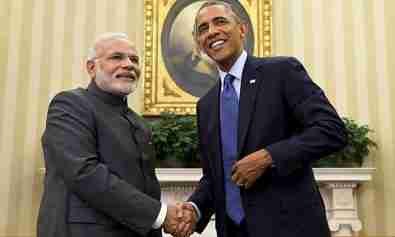As Prime Minister Narendra Modi turns his attention to governance after his massive electoral victory, he will find that a number of challenges beckon him on the foreign policy front. From managing India’s periphery to engaging major global powers, challenges abound which will demand all the diplomatic and leadership skills Modi and his team can muster.
Modi has been a foreign policy Prime Minister in his first term. He relished global engagements and never gave an impression that his lack of experience on the foreign policy front was a handicap. In fact, he made it his strength as he encouraged greater involvement of Indian states in diplomacy. He led from the front in diplomatic engagements and managed to carve out personal equations with world leaders which has paid dividends. Modi also has been successful in selling Brand India abroad and in leveraging the vast Indian diaspora to national causes. He took risks in his foreign policy and more of than not succeeded in converting them into substantive gains for India.
For all his successes so far, Modi will find that there is hardly any time to rest on his laurels. Global and regional realities are evolving at a pace which traditional diplomacy is finding difficult to comprehend. At the global level, the developed world continues with its navel gazing, the kind which would have been unthinkable just a few years back. The Trump Administration is challenging the fundamentals of economic globalisation and its trade and technology conflict with China is escalating. The consequences for a global economy, already facing negative headwinds from multiple directions, can only be deleterious. For India, this is a big challenge for a stable global economic order is sine qua non for its global rise.
Indo-US tensions with trade are bubbling under the surface and Modi will have to work out a way to resolve these tensions with a Trump Administration which may get even more intransigent as it enters the election phase. Where Indo-US strategic partnership is likely to continue becoming stronger, the economic dimension of the relationship needs serious work. The role of Iran and Russia in the Indo-US bilateral matrix will also need addressing.
Meanwhile, China’s growing global footprint is constraining India’s options significantly. Globally, as India tries to make a case about its own role and place in the international order, China continues to push back and remains reluctant to acknowledge India’s global rise. Despite Modi’s China outreach in Wuhan, bilateral disputes remain far from resolved. And this is also having an impact on India’s engagement in its immediate periphery in South Asia and the Indian Ocean region. India’s neighbours continue to look to China as a power with more capabilities and increasingly serious intent whereas India’s inability to deliver and economically integrate the region makes New Delhi regional outreach challenging.
The Pakistan problem is unlikely to go away anytime soon and Modi will have to continue to find different means of managing the challenge. Growing Sino-Pak axis adds another dimension to this problem. One of the most immediate challenges in the neighbourhood for India will be to find a place for itself in the unfolding peace process in Afghanistan. Though there is hardly any clarity on the pace and direction of this process, there is a push to see it through to some sort of conclusion. Modi will have to remake the case of India’s relevance in the unfolding dynamic in Afghanistan.
A range of other issues would demand Modi’s immediate attention. Rising tensions in the Middle East between Iran and the US will test India. Comfortable assumptions of the past about balancing the trifecta of Iran, Arab Gulf states and Israel will no longer suffice. India’s energy security requires a stable Middle East and New Delhi will have to raise its profile in the region with all the attendant consequences.
A more coherent response to China’s formidable Belt and Road Initiative (BRI) will be needed as multiple infrastructure initiatives are emerging. India’s place in this network remains as of yet undefined. Engaging with like- minded powers in the Indo-Pacific will remain a priority and the Quadrilateral grouping’s agenda too requires serious recalibration. Finally, re-defining the parameters of Indo-Russia ties will have to be a priority as Moscow gets closer to Beijing and ceases to act as a bulwark for protecting Indian interests.
In his first term, Modi had succeeded in articulating a global role for India as a leading player in the international system, one which shapes global rules and is not merely a rule-taker. In his second term, he should be focusing more on how to operationalise this idea into concrete policy outcomes. This will involve building an institutional framework which can engage in long- term strategic thinking more effectively than in the past as well as strengthening the economic and military building blocks of India’s comprehensive national power.
Professor Harsh V. Pant is Director, Studies and Head of the Strategic Studies Programme at Observer Research Foundation, New Delhi.


